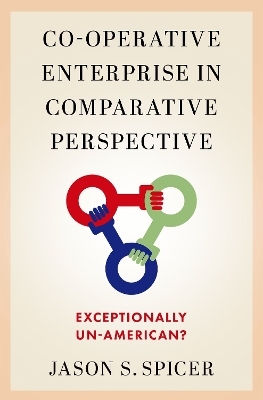
Co-operative Enterprise in Comparative Perspective
Oxford University Press Inc (Verlag)
978-0-19-766507-7 (ISBN)
- Lieferbar (Termin unbekannt)
- Versandkostenfrei
- Auch auf Rechnung
- Artikel merken
Co-operative enterprises, which are democratically owned and governed by their workers, customers, or suppliers, have long captured the imagination of activists and social scientists alike. In centering economic democracy and a collectivist-democratic logic, and in embodying a "third way" alternative to profit-maximizing corporations and state-owned enterprises, co-operatives offer the promise of a more sustainable and equitable economy.
Despite extensive study of co-operatives' real and imagined benefits, we know little about the conditions under which they achieve the lasting scale needed to be a viable alternative and transform the economy. Under what conditions can co-operatives achieve such scale? And are such conditions present in the United States, where, despite repeated organizing efforts, co-operatives remain exceptionally rare at scale?
Through a rigorous comparative-historical analysis of co-operative enterprises in different national contexts, this book seeks to answer these questions. Deploying two different variants of the new institutionalism, Spicer treats the United States as a central case of comparative failure, as contrasted to three rich democracies where the co-operative business model has been more successful: Finland, France, and New Zealand.
The cause of co-operatives' comparative weakness in the United States is identified as reflecting the joint effect of economic liberalism and structural racism. Only in the United States did the co-operative face, in its initial development, two well-entrenched incumbents operating with competing ownership models: the investor-owned firm and the race-based chattel slavery system of ownership of people. Proponents of these two models acted to deprive the co-operative movement of resources, and undermined the solidarity at the co-operative business model's heart, splintering the American co-operative movement in the process. In subsequent waves of co-operative organizing, advocates have never fully succeeded in overcoming these initial obstacles, resulting in a different outcome in the United States, consistent with broader conceptions of the United States as a perennial outlier (i.e., ""American exceptionalism""). In contrast, in the successful cases, advocates were better able to leverage resources to animate a national solidarity and procure the necessary political and economic resources to achieve scale.
Jason Spicer is an Assistant Professor in the Marxe School of Public and International Affairs at CUNY Baruch College, where he focuses on social and community entrepreneurship. Prior to joining CUNY, he spent five years on the faculty of the University of Toronto (St. George), where he oversaw the economic development concentration in the graduate urban planning program. He holds a PhD in Political Economy from MIT. He has published many articles on co-operatives and related alternative enterprise forms in academic journals across the social sciences.
Chapter 1 Introduction: Co-operative Enterprise, Exceptionally Un-American?
American Co-operative Development Through a Comparative Lens
The Argument in Brief
Plan and Outline of the Book
Chapter 2 Conceptualizing The Comparative Development of Co-operative Enterprise
Co-operatives 101: A Primer
Case Selection and Overviews
Comparing Institutionalisms: Historical Institutionalism vs. Field Theory
Chapter 3 Finland, the Co-operative Commonwealth?
Co-operatives as an Offensive Strategy in Finnish Nation Building, 1800s - 1945
Co-operatives as Defense: Finlandization, The Cold War and A Tale of Two Co-operative Movements, 1946 - 1995
Co-operatives as Globalization Insurance: Liberalization, European Integration, and the Return of Russia, 1995 - Present
Chapter 4 Co-operatives As the Heart of France's Social and Solidarity Economy
The French Evolution? Co-operatives' Slow Emergence in Modern France, 1780s - 1860s
A Field in Full: From
| Erscheinungsdatum | 25.08.2024 |
|---|---|
| Verlagsort | New York |
| Sprache | englisch |
| Maße | 164 x 242 mm |
| Gewicht | 594 g |
| Themenwelt | Sozialwissenschaften ► Soziologie ► Allgemeines / Lexika |
| Sozialwissenschaften ► Soziologie ► Mikrosoziologie | |
| ISBN-10 | 0-19-766507-1 / 0197665071 |
| ISBN-13 | 978-0-19-766507-7 / 9780197665077 |
| Zustand | Neuware |
| Haben Sie eine Frage zum Produkt? |
aus dem Bereich


